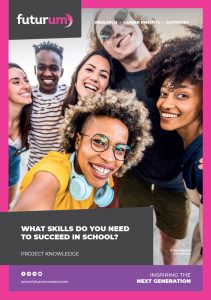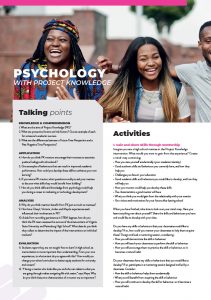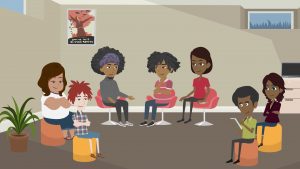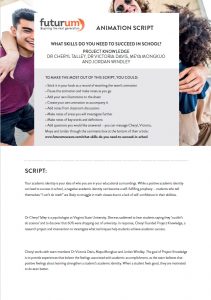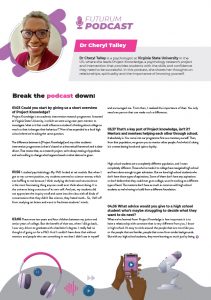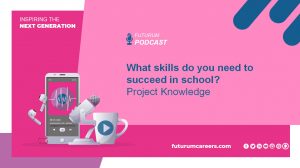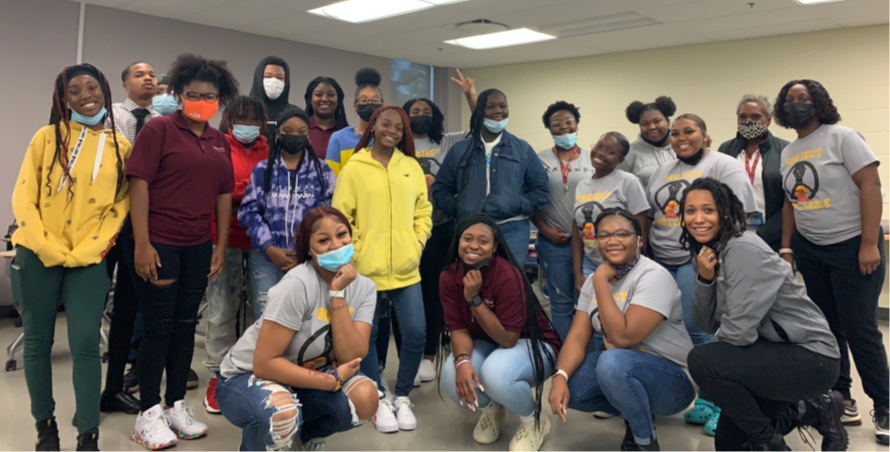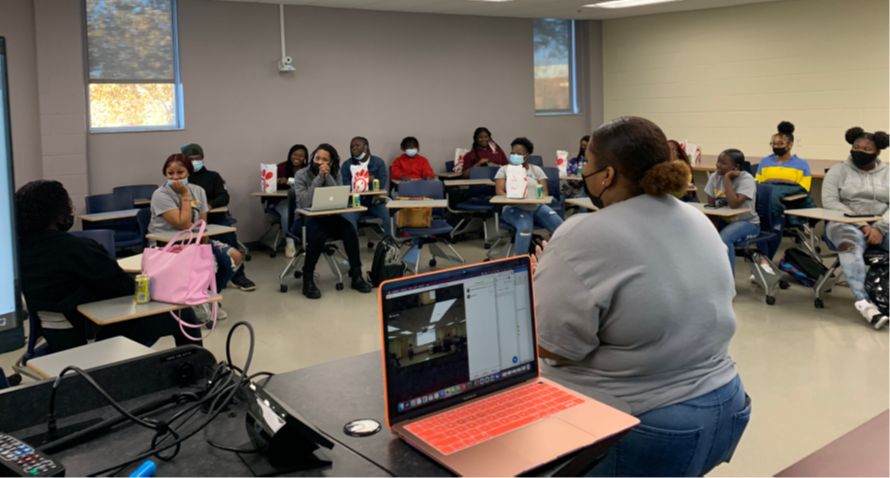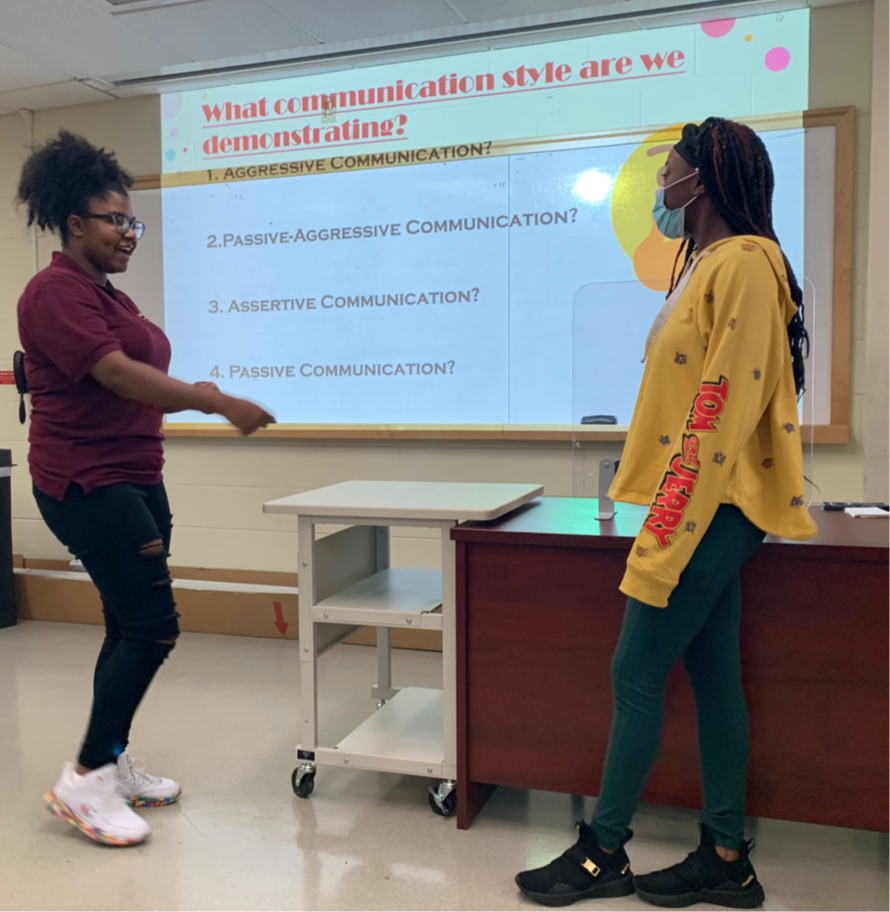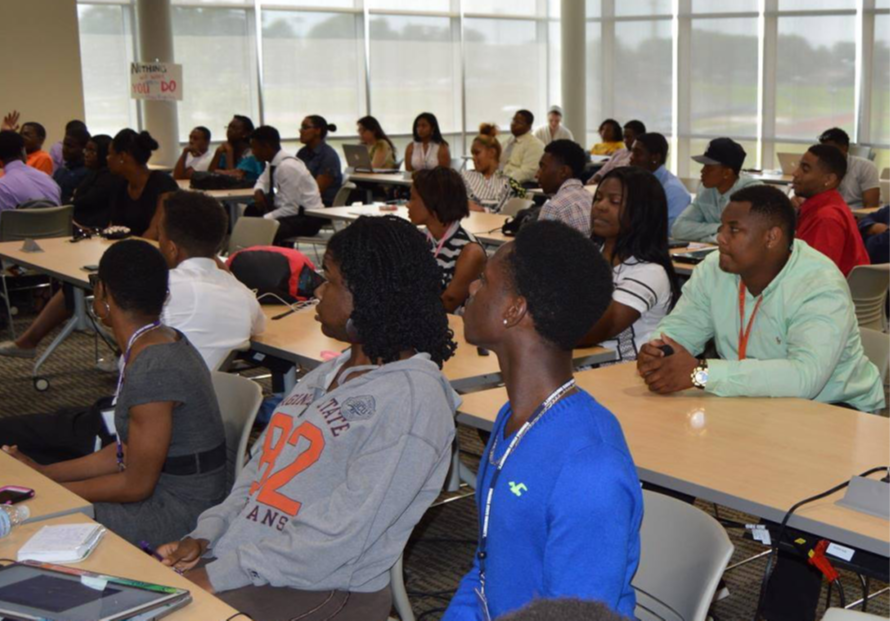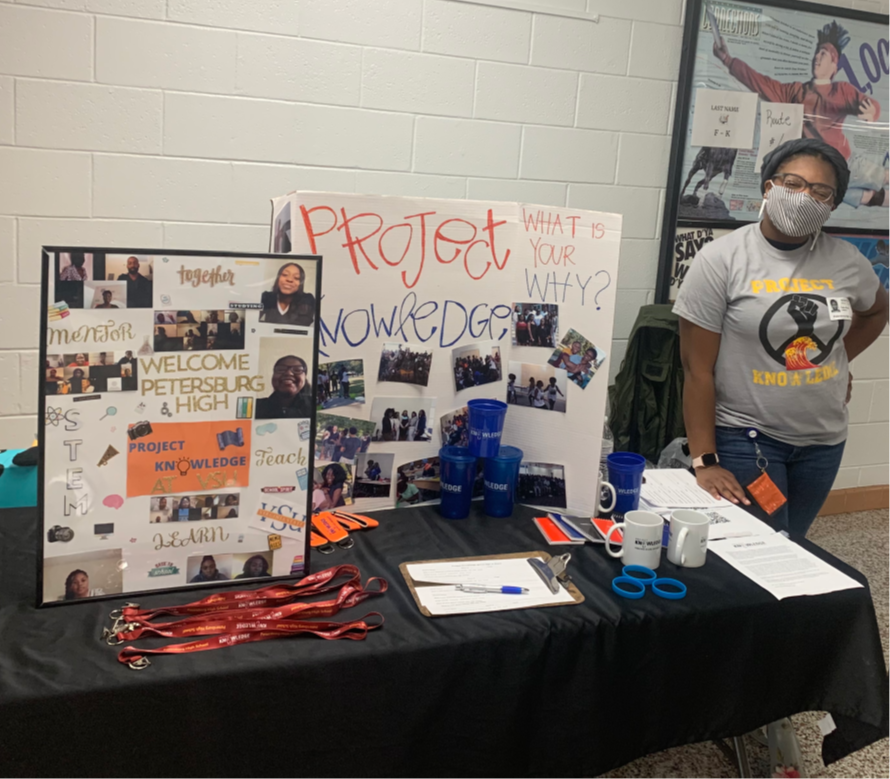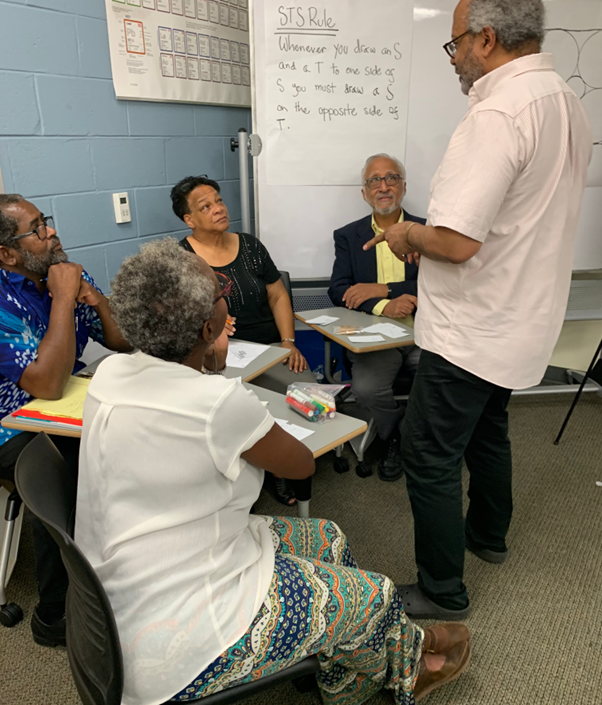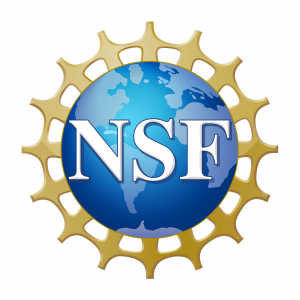What skills do you need to succeed in school?
Your academic identity plays a key role in your education. Students with low self-confidence in their abilities are more likely to struggle in school and withdraw from university. To address this, Dr Cheryl Talley founded Project Knowledge, a research project and academic intervention at Virginia State University, USA, which has since expanded to a local high school. Using psychology theories and methods, this landmark programme provides students with the skills and confidence they need to succeed.
TALK LIKE A PSYCHOLOGIST
Academic identity — how a person views themselves within their educational environment
Emotion regulation — the ability to control your emotions
Future Time Perspective (FTP) — a belief that doing things now will result in future rewards
Historically Black College/University (HBCU) — in the US, a school of higher learning that was accredited and established before 1964, whose principal mission is the education of African Americans
Intervention — an action or activity used to change a person’s behaviour or feelings
Near-peer — someone who is close to you in age
Past Negative Time Perspective (PNTP) — a belief that the present is influenced by bad things that happened in the past
Protective factor — a characteristic that increases the likelihood of positive outcomes
Risk factor — a characteristic that increases the likelihood of negative outcomes
Semester — half an academic year
STEM — Science, Technology, Engineering and Mathematics
What is your favourite subject, and which subject do you find most challenging? Where do you think your strengths lie in these subjects, and where do you feel you struggle? We all have a sense of academic identity, a perceived idea of who we are within our educational surroundings. While a positive academic identity can lead to success in school, a negative academic identity can become a self-fulfilling prophecy – students who tell themselves “I can’t do mathematics” are likely to struggle in mathematics classes due to a lack of self-confidence in their abilities.
“I heard so many of my students say that they hate science or that they can’t do science,” says Dr Cheryl Talley, a psychologist at Virginia State University (VSU). “This didn’t sit well with me.” Some years ago, she became aware that as many as 60% of students failed to receive a degree within six years, with the majority of those students dropping out before completing all of their required introductory courses.
VSU is a Historically Black College/University (HBCU). Many of its students qualify for federal financial aid. The need for income-based financial assistance often translates to being underprepared for the challenges of college and a greater chance of dropping out before the end of the third semester. This attrition problem is not unique to VSU. However, Cheryl was appalled by the prospect of contributing to an HBCU student leaving university with debt and no degree.
In response to this, Cheryl founded Project Knowledge in 2011. Project Knowledge (PK) is a research project, drawing on theories and methods from psychology to discover what techniques work best for encouraging students to stay in university. A key aspect of PK is the intervention, in which older VSU students mentor first-year students, encouraging them to develop their confidence and providing tools for a more robust learning mentality. As a result of PK’s success at VSU, the intervention has since been expanded to a local high school, where students are taught the skills needed for academic success.
Project Knowledge’s aims
“The goal of PK is to provide experiences that bolster the feelings associated with academic accomplishment,” says Dr Victoria Davis, PK’s Program Manager. “We believe that positive feelings about learning strengthen a student’s academic identity.”
Studying the traits of STEM students who did not drop out of university, the team discovered they shared common characteristics that lend themselves to academic achievement. The team identified two principal groups of factors that affect whether or not students stay in university. Protective factors (e.g., self-confidence, aspirations for the future, strong learning habits) encourage students to persevere, while risk factors (e.g., perceived failure, lack of motivation, poor learning techniques) decrease a student’s engagement and increase their likelihood of leaving.
“The focus of PK’s intervention is to increase protective factors and decrease risk factors,” says Meya Mongkuo, PK’s Wellness Coordinator and Research Analyst. “It is important that the intervention is not seen as remedial, as once students are labelled as needing academic help, the associated stigma can demotivate them.”
The importance of identity
A positive sense of academic identity is key to realising PK’s vision. “According to the theories behind this research, students who identify as ‘smart’ commonly exhibit behaviours that correspond with academic achievement,” says Jordan Windley, PK’s Program Manager. “This self-identification is thought to be associated with good academic habits and behaviours, such as emotion regulation and organised note-taking, that reinforce this identity.”
Your self-identity is, in a large part, dependent upon the relationships you have with those around you. For this reason, building trusting relationships between mentors and mentees lies at the heart of PK. “We use near-peer mentoring activities to provide experiences that associate positive feelings, such as self-confidence, with schoolwork, while diminishing negative feelings that may be associated with past academic experiences,” explains Jordan.
Project Knowledge in action
For the intervention at VSU, first-year students are assigned to a small group led by an older student, who also acts as their personal mentor. The groups meet formally every week and informally on a more frequent basis, and mentees also receive one-to-one training from their mentor. The small group sizes and close connections between mentor and mentee mean strong relationships develop over the course of the year.
Many students report that in high school, memorisation of facts is more important than understanding of concepts, and so they lack the skills needed to succeed in university. “Students feel the process of ‘learning how to learn’ was always assumed, but never actually taught,” explains Meya. The intervention focuses on providing students with the skills and resources required for successful learning.
Mentoring sessions teach techniques such as using a calendar to improve time management, reviewing class notes within 24 hours to increase retention, and active studying to ensure understanding. Rather than passively rereading textbooks and reciting facts, active studying involves engaging with the material, for example, by explaining concepts in your own words.
The informal sessions led by mentors often take place as study groups, where mentees can witness good academic practices in action. “We have realised that students learn through seeing behaviours modelled and reinforced by other students,” says Meya.
Perspectives of time
To dig deeper into the psychology behind academic success, Victoria has been researching how students perceive time, which appears to strongly influence whether they stay in university. “In essence, academia rewards people who have a Future Time Perspective (FTP), who believe that doing things now will result in future rewards,” she explains. “However, most VSU students do not have an FTP, but a Past Negative Time Perspective (PNTP), in which they believe the present is influenced by bad things that happened in the past.”
Your perspective of time has an impact on your behaviour. “A PNTP means many students don’t prepare for assignments until the deadline has almost arrived,” says Victoria. “Then, when they inevitably don’t do well, they see that failure as more significant than it ought to be.” A PNTP therefore acts as a risk factor, while an FTP can act as a protective factor against the challenges of education.
This is an important insight as it indicates where interventions should be focused. “It is important to encourage students to relate to school from the perspective of their future self,” explains Victoria. “This shift of perspective from your present circumstances to your future self is more likely to occur inside of trusting relationships.” Such relationships form the backbone of PK.
From university to high school
As PK grew from strength to strength, the team realised there could be value in instilling good academic habits and mindsets earlier in a student’s educational journey, and so the intervention was expanded from VSU to Petersburg High School (PHS) in 2019. “The aim was to create high school students who are university-ready, while also increasing the number of students aspiring to attend university,” says Cheryl.
In the PHS version of the intervention, mentors are first-year VSU students, in a role reversal from their position as mentees in the VSU intervention. “The idea is that the mentoring experience itself provides an intervention for these university students,” says Jordan. “The motivation to adopt successful academic habits would be driven by their desire to serve others, rather than by participating in a programme where they could be identified as in need of help.”
When the PHS intervention was forced to move online during the COVID-19 pandemic, the VSU mentors responded to the challenge by displaying greater levels of creativity, discipline and commitment. “PK served as a protective factor against loneliness and isolation, and PHS students involved in PK had improved mental and emotional health,” says Victoria.
Faced by the society-wide challenges of the pandemic, mentors did not limit their teaching to academic habits. “Mentors also delivered training on coping with anxiety and depression, expressing gratitude, and meditation,” says Meya. Being able to deal with and flourish within such challenging conditions shows the value of PK for building resilience within mentees and mentors alike.
Benefits of bi-directional relationshipsThe results of the PK research clearly show that benefits go both ways, with both mentors and mentees displaying enhanced academic outcomes. “Near-peer mentoring not only sharpens mentees’ academic identity, but gives mentors motivation to continue to improve,” says Jordan. “By acting as role models, mentors provide mentees with a vision of themselves as successful STEM students, while also strengthening their own academic identity through the process of helping others to achieve.” This fostering of relationships, rather than a direct focus on academic ability, can pave the way for a more inclusive and supportive academic community.
Project Knowledge successes
Reference
https://doi.org/10.33424/FUTURUM340
Given its core research aim, the impacts of PK have been carefully monitored and have shown great success. “From 2011 to 2019, over 80% of the 200 students that participated in PK persisted in their STEM degree,” says Cheryl. “This is greater than the national average and double the previous VSU STEM persistence rate.”
The team now hopes the lessons learnt in PK can be applied to HBCUs and minority serving institutions across the country, thereby equipping students with the skills and confidence needed to achieve success, allowing them to go far in life.
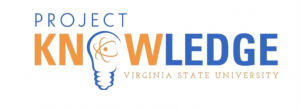 Project Knowledge
Project Knowledge
Virginia State University, USA
Field of research: Psychology
Research project: Using psychology to explore the best methods for instilling good academic habits in students and encouraging them to continue in higher education
Funder: US National Science Foundation (NSF) Project Knowledge has been supported by the following NSF grants: #220370, #181458, #1835851, #1923754, #199218, #8012032
ABOUT PSYCHOLOGY
Psychology aims to understand why people think and behave the way they do. There are many branches of psychology, including fields examining the biological, social and developmental influences on human thoughts and behaviours. This section explores the branches of psychology studied by Project Knowledge team members.
Biological psychology investigates how biological processes impact behaviour. Cheryl initially trained in neuroscience, but now addresses larger psychological questions. “Neuroscience focuses on cellular mechanisms to explain behaviour,” she says. “In the real world, human activity is influenced by biological, mental and emotional processes, as well as social environments. It is only by combining knowledge from different fields that we can tackle complex problems such as a student’s identity.”
Clinical health psychology uses psychological knowledge to provide mental and behavioural healthcare. “Clinical health psychology focuses on both the mind and body,” says Victoria. “Since they are connected and affect one another, this field teaches us to view individuals as a whole and to use dynamic, holistic approaches to healing.” Clinical health psychology has practical applications in all aspects of healthcare. “Its distinction is to assess and manage severe illness and disability,” explains Meya.
Behavioural psychology focuses on the impact of people’s environments, such as community settings, on their thoughts and behaviours. “This mostly involves research into health promotion and disease prevention,” Jordan says. “This is done by examining related psychological, social, emotional and behavioural factors in physical and mental health.”
Pathway from school to psychology
• Mathematics and science are important for developing analytical thinking and problem-solving. “Science requires imagination and creativity,” says Cheryl, who also recommends studying art, literature and music.
• Study English and develop your communication skills, as Jordan emphasises that psychology involves a lot of reading and writing.
• Victoria recommends interviewing local psychologists, getting involved with psychology organisations and seeking experience in a research lab. These will build your skills and inform your decisions on what branch of psychology to pursue.
• Most universities offer degrees in psychology, where you will be able to specialise in the field that most interests you as you progress through your studies.
• Alongside your psychology classes, Meya recommends taking classes in statistics and the philosophy of ethics.
Explore careers in psychology
A degree in psychology does not limit you to being a psychologist, as it will equip you with a range of skills that can be applied to any career.
Some examples include:
• Academia – research is integral to learning more about psychology and teaching is essential for passing this knowledge to the next generation
• Clinical work – the interactions between physical and mental health means knowledge of psychology will help in organising clinical programmes and the diagnosis of psychiatric disorders
• Community work – psychology will give you the skills to help communities and organisations become more effective and take care of their members
• Law – forensic psychology applies psychology within the legal system, and all aspects of law require an understanding of how people think and behave
• Marketing – every advert relies on psychology to persuade a consumer to buy or do something
• Policy – developing effective, people-focused policies involves an understanding of how people think
• Technology – user-friendly technologies can only be produced if computer science and engineering are combined with psychology
• Therapy – you can help others improve their own mental health by teaching them how to change their thought patterns
Meet the team
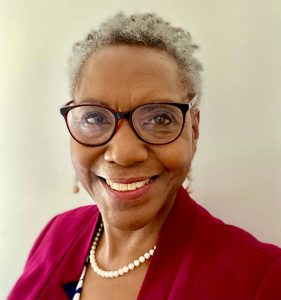
Dr Cheryl Talley
Project Knowledge role: Principal Investigator
Fields of research: Biological Psychology and Neuroscience
When I was young, I wanted to be a doctor until I realised I didn’t like seeing people in pain. I became interested in psychology as an undergraduate but wondered why the textbooks all referred to white people as ‘normal’.
I was inspired to go into research because I wanted to make a difference. I have been motivated by curiosity and dogged determination. Along the way, I’ve learned that it’s less important to have a determination to succeed, but rather the determination not to quit.
Every step of my educational journey has been about not quitting. I left college in my third year when I had a baby, and then waited ten years before completing my bachelor’s degree. I was often tempted to give up on my education, but I kept telling myself, “Next year, I’ll be in school”. And eventually, I was. I returned to college as a wife and mother of four children.
During graduate school, I had an hour-long commute across the Blue Ridge Mountains. I started to turn off the music and began to use that hour to have time with myself. The realisation of my own power provided me with the confidence to seek the help I needed, and I graduated with a PhD in psychobiology.
As a neuroscientist, I worked in a rat lab studying basic mechanisms that did not have direct clinical applications. I had a spiritual epiphany, became a vegetarian, and could no longer justify the killing of lab animals. However, I enjoyed research so decided to apply my investigative skills to the science of teaching and learning.
My biggest motivator is to know myself. The motto behind Project Knowledge (‘The greatest knowledge is self-knowledge’) has come from my own journey. Our goal is for students to know that they are capable of learning. Once students understand their own power, they will have the motivation to succeed.
My ambition is to grow our educational technology company, Phygital Learn LLC, through which we are applying the principles we’re learning in Project Knowledge to early readers. We have created a tablet-based reading programme that teaches reading fluency through stories containing pictures and dialogues recognisable to African American children.
Cheryl’s top tips
1. Be observant and curious. Observe yourself and be curious about how you can improve. If you learn to be the best version of yourself, you will succeed in life.
2. Never stop learning. Choose something you are interested in, and challenge yourself to learn more. Choose a skill and practise until you have mastered it.
3. Consider failure your best teacher. Change directions if you need to, but never quit.
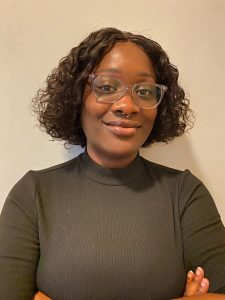
Jordan Windley
Project Knowledge role: Program Manager
Field of research: Behavioural and Community Health Psychology
I’ve always been interested in human behaviour. If I hadn’t become a psychologist, I would have been a lawyer. I loved law movies as a kid and always dreamed of defending a client.
In sixth grade, I read a book called Hitler: The Pathology of Evil, which interested me in the criminally insane. I wanted a deeper understanding of what could drive evil behaviours, so I set my sights on becoming a forensic psychologist, hoping to criminally profile someone someday.
I joined Project Knowledge because I wanted to be part of a programme that makes a difference in the lives of adolescents. I am excited by the opportunity to build relationships with the youth in our community. Our mentoring not only helps the teens form responsible, healthy relationships, but has been shown to improve their mental health.
My PhD research will involve exploring where thoughts of suicide come from in African American adolescents. This idea came about while working with some students in Project Knowledge. I hope to do research into prevention models for these adolescents struggling with concepts of suicide or violence in their communities.
It has been a long journey to get where I am now, and I still have a way to go. I’ve changed my mind several times about what career path to follow, as I’ve been exposed to many different facets of psychology. I also serve as an in-home counsellor for children, and community work has kept me motivated throughout this journey.
Completing my master’s degree was a big highlight. It was a difficult responsibility and took longer than it should have, as some of my mentors left the university part way through my degree and it was during the height of the pandemic. But it all felt worth it once it was completed.
Jordan’s top tips
1. Ask everybody questions. When you meet interesting people in different positions, ask how they got there. This could help you along your journey.
2. Try everything at least once. There are lots of options available for psychology students, so gain experience to discover what you do and don’t enjoy.
3. Make friends and network. It’s important to have people you can learn from and who can offer you opportunities in the future.
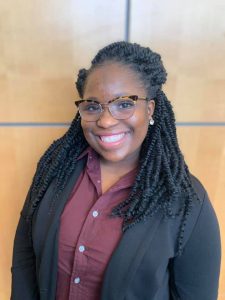
Dr Victoria Davis
Project Knowledge role: Program Manager
Field of research: Clinical Health Psychology
When I was younger, I wanted to be a fashion designer with motivational messaging. At high school, I was good at math but I wasn’t interested in engineering, so one of my favourite teachers suggested I explore psychology instead.
I have always been inspired by the mentors in my life. When I heard that Project Knowledge focuses on making students aware of their potential through mentoring, I knew I wanted to be involved. I am excited by the opportunity to inform others about Black student learning through culturally tailored research aims.
I was a first-generation college graduate on my father’s side and the only doctor in my family. Knowing I was leading the way helped me continue with my PhD, which focused on finding a way to measure student resilience with regards to STEM achievement.
The highlight of my academic journey so far was having my parents watch me defend my dissertation. I hope to publish at least three articles from my PhD research, work as a clinician, and help businesses develop culturally competent practices.
Victoria’s top tips
1. Be authentic.
2. Never say no to an opportunity just because you are not interested.
3. If you are ever afraid, feel the fear and do it anyway.
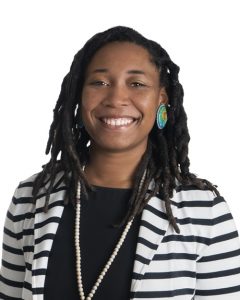
Meya Mongkuo
Project Knowledge roles: Wellness Coordinator and Research Analyst
Field of research: Clinical Health Psychology
When I was younger, I just wanted to be happy. I enjoyed dancing to Afro-Cuban music, swimming in the ocean, and having barbecues at the beach with family.
I took a psychology class in college, while I was failing miserably in my chemistry and pre-medicine courses. A lightbulb ignited when I was in that class – it just clicked, and the concepts made sense to me. I started taking more classes in psychology and that’s when I knew it was my path.
I attended the Black Psychology Conference at VSU, which inspired me to enrol at VSU for my PhD. It is very rare to see a clinical health psychology programme at an HBCU. I was hooked by the opportunity to sit at the feet of giants in the field of psychology who were African American, and I was motivated by having mentors who were open to me asking questions and who gave me space to learn and inquire.
Having a mentor who looks like you and who can relate to what you are going through makes navigating life a bit easier. You don’t feel as alone when you face difficult situations.
My father was a professor and having the opportunity to work with him and present our research together was an honour. We won the Best Paper Award at an international conference, with my mother cheering us on, which is a highlight of my academic journey and a symbol of redemption for my family. It was an honour to continue his legacy as, unbeknownst to us, this was one of his last publications before his passing.
My PhD research involves mindfulness practices for Black, Indigenous and People of Colour (BIPOC) and how they affect health and well-being. In the future, I hope to curate healing spaces for BIPOC people to reconnect with their ancestral wisdom, and, as in the past, I just want to be happy.
Meya’s top tips
1. Allow time to know yourself.
2. Humbly learn from the feet of Elders. Commit to continue their legacy and pass it forward to future generations.
3. Seek mentors who can help guide you along your path.
Do you have a question for the team?
Write it in the comments box below and the team will get back to you. (Remember, researchers are very busy people, so you may have to wait a few days.)

